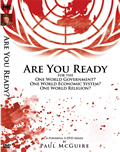By
Timothy N. Baldwin, JD.
January 16, 2012
NewsWithViews.com
The New American magazine recently reported Oklahoma’s proposal of a State constitutional amendment which prohibits their courts from using “international law” and “Sharia law.” The amendment was purportedly proposed as a preemptive strike to prevent courts from ruling cases “unfavorable” to the ideas upon which the constitution of the United States was ratified. While those in Oklahoma may have good intentions, this amendment displays at least some ignorance as to the role and function of the courts as well as an overly-vague use of terms; and ironically, the amendment undermines the foundation of our country—the thing they want to save.
The Oklahoma constitution amendment proposal states,
“The Courts provided for in subsection A of this section, when exercising their judicial authority, shall uphold and adhere to the law as provided in the United States Constitution, the Oklahoma Constitution, the United States Code, federal regulations promulgated pursuant thereto, established common law, the Oklahoma Statutes and rules promulgated pursuant thereto, and if necessary the law of another state of the United States provided the law of the other state does not include Sharia Law, in making judicial decisions. The courts shall not look to the legal precepts of other nations or cultures. Specifically, the courts shall not consider international law or Sharia Law. The provisions of this subsection shall apply to all cases before the respective courts including, but not limited to, cases of first impression” (emphasis added).
‘International Law’ Preclusion
Those who drafted and supported this amendment presumably had good motive to “preserve” the Supreme Law of the Land. However, the jurisprudence adopted and used in the United States before and after 1787 demonstrate the study of human nature as the source of law. This study of law was described as the Laws of Nature, Law of Nations, Common Law, Universal Law, International Law, and the like.
To preclude a judge from considering “international law” distorts our own history and founding. A study of the Federalist Papers reveals as much that international and common law, use, and customs were used to formulate our own constitutional structure and governmental form.
For a judge to interpret and apply the fundamental law (constitution), he must study and understand the words and sense of the constitution as meant and intended by the makers and ratifiers of the constitution. The constitution’s words and sense derive from a universal understanding given the historical, political, legal, and cultural context as the words were used.
While this rule of construction will largely preclude the courts from reaching outside American jurisprudence to form its judgment, there are conceivable cases where the court should and must look outside America’s short history to expound or understand concepts and terms. Were a court precluded from considering “international law”, the court would not be able to understand the true meaning and sense of words and usages in the United States Constitution. Thus, the ACLU’s position is correct when it states that “preventing courts from considering international law violates the [United States] Constitution and undermines the ability of courts to interpret laws and treaties.”
I go back to my usual soapbox concerning the seeds and roots of America’s founding. These roots go back thousands of years and encompass a wide and large school of thought from the story of Adam and Eve (i.e. Hebrew) and classical republicanism (i.e. Rome and Greece), to the Enlightenment Period (i.e. Europe). Under the Oklahoma amendment, the courts would be prohibited from considering these classic sources.
These studies of human nature, government, and society gather knowledge not from anachronistic and myopic approaches. English common law, which is still used in America, derives from the study of natural law and to some extent, Biblical revelation, which had nothing to do with territory, culture, or statutory scheme.
Common law mostly dealt with observation, reason, and logic—to explain, obtain, and maintain the rights of mankind. In addition, common law’s historical context goes back to our days as English colonies. In a sense, the United States still operates under a form of international law with common law precepts and concepts, which were developed over thousands of years in foreign countries.
The United States Constitution is the Supreme Law of the Land, yes. That is a given. But that cannot preclude a court from looking at international law to understand concepts as meant and intended in 1787 upon the constitution’s ratification or to explore some other vague or obscure meanings given unforeseen and novel facts.
‘Sharia Law’ Preclusion
At the expense of getting criticized for this particular critique, objective persons must put aside personal feelings or emotions, which may unjustifiably sway reason. That being said, the New American magazine article observes and concludes the following concerning Sharia law’s harmful impact on society and implicitly the United States:
“For fuller context of the controversy, one need understand that Sharia, which means ‘path’ in Arabic, is the sacred law of Islam. As noted above, the precepts of Sharia have two sources: the Koran and the writings of Mohammed. Sharia is the code that is responsible for the stoning of adulteresses; the caning of rape victims; and the restrictions on dress, rights of inheritance, and marital status of women. Institutional acceptance of this legal code has expanded rapidly, and frightfully to some, in Europe.”
Since I am a Christian, my observations here may appear counter-intuitive to some. Still, when I read this comment, I cannot help but to respond by saying, the Bible demonstrates these same kinds of laws particularly for Israel’s society in the Old Testament. There is no need to go into theological detail here, nor is my comment meant to invoke a detailed discussion of the differences between the Bible and Sharia law. Distinctions will be admittedly conceded.
The point to understand is this: if one is going to propose a constitutional amendment like this, he should consider the Bible, among other religious references, was used in weaving the United States’ fabric—the Bible containing both international law and illustrations disagreeable to American jurisprudence.
So, if a judge uses the Old or New Testament to support a decision disagreeable to our American jurisprudence, would anyone propose an amendment to exclude the Bible from being used in support of the courts’ decisions? I think not; and rightfully so.
| Subscribe to the NewsWithViews Daily News Alerts! |
This illustrates that a constitution, established for secular and civil purposes, will have a very difficult, if not impossible, time excluding ideas and sources of knowledge—regardless of their origin—from being explored in cases of judicial review.
For the court to fulfill its duty to “say what the law is,” the court must be able to use the universal thought of ideas to explore and ascertain words, usages, meanings, and understandings. That is not the danger.
The danger is when courts impose and force their own interpretation and conjectures of the constitution contrary to the makers. If Oklahoma wants to protect the rule of law, their amendment should address judiciary rules of constitutional construction (e.g., Amend. 11, U.S. Const.), not prohibit the use of resources, ideas, and concepts.
� 2012 Timothy N. Baldwin, JD - All Rights Reserved
Sign Up For Free E-Mail Alerts
Timothy Baldwin is an attorney licensed to practice law in Montana (and Florida) and focuses on constitutional issues. Baldwin graduated from the University of West Florida in 2001 with a Bachelor of Arts (BA) degree in English and Political Science. In 2004, Baldwin graduated from Cumberland School of Law in Birmingham, AL with a Juris Doctorate (JD) degree. From there, Baldwin became an Assistant State Attorney in Florida. For 2 1/2 years, Baldwin prosecuted criminal actions and tried nearly 60 jury trials. In 2006, Baldwin started his private law practice and has maintained it since.
Baldwin is a published author, public speaker and student of political philosophy. Baldwin is the author of Freedom For A Change, Romans 13-The True Meaning of Submission, and Political Discussions for People of States–all of which are available for purchase through montanalibertyforum.com/mlf. Baldwin has also authored hundreds of political science articles relative to liberty in the United States of America. Baldwin has been the guest of scores of radio shows and public events and continues to exposit principles which the people in America will need to determine its direction for the future.
Web site: www.montanalibertyforum.com/mlf
E-Mail: tim@libertydefenseleague.com














 Share
This Article
Share
This Article







